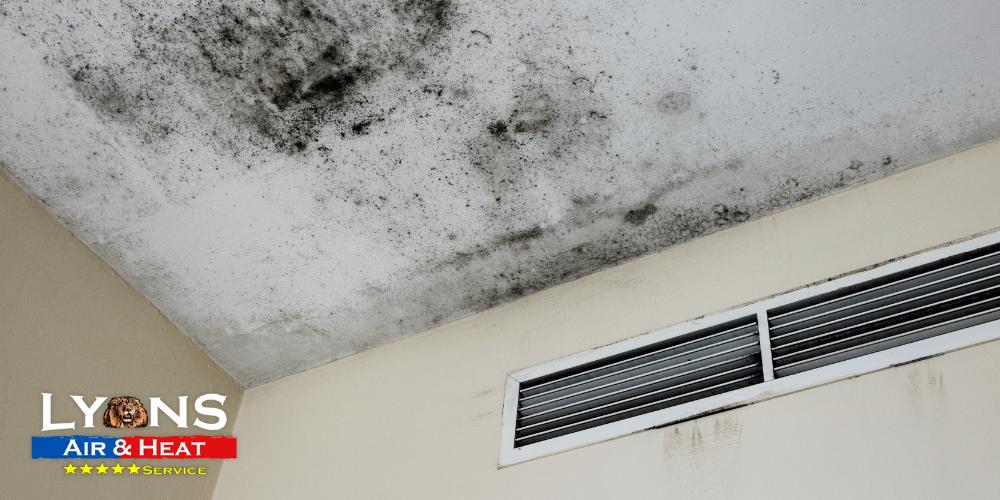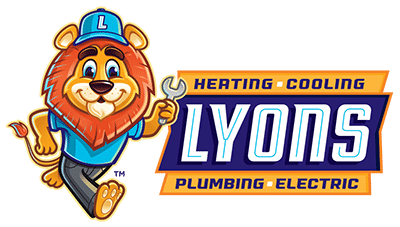Air conditioning systems are integral for maintaining comfort within our homes, especially during those sweltering Texas summers. However, while they tirelessly work to keep our spaces cool, these systems can sometimes harbor unwanted guests–mold spores.
Mold can be a difficult problem to eliminate, especially when mold starts growing in household appliances like central AC and window AC units. The presence of mold in your AC system isn’t just a maintenance issue; it can make your air conditioner dangerous, negatively affecting the health and safety of you and your family.
If you find yourself facing any AC troubles and you suspect mold might be the culprit, the Rockwall air conditioning pros at Lyons Air & Heat are here to help. Our team of experts is ready to help ensure your HVAC system remains mold-free and functions efficiently. Call us at (469) 224-1512 to learn more about our services or to schedule repairs with us today.
What Causes Mold Growth in Your Air Conditioner?
Regardless of whether you have a central air conditioning unit or a window air conditioning unit, mold can grow in and around your system, primarily from an accumulation of moisture. Air conditioners are designed to remove humidity from the air, but by doing so, they produce condensation. When drainage systems malfunction or become clogged, it can cause water to accumulate, and standing water is a prime environment for mold.
Additionally, neglecting regular AC maintenance can trap debris, like dust and pollen, in the filters. When combined with moisture, these offer a fertile ground for mold spores. Issues like poor ventilation, dirty ductwork, malfunctioning drain pans, and the presence of organic material in the system can easily cause air conditioner mold.
Dangers of AC Mold Growth
Mold in your air conditioner can have a serious effect on your health. When inhaled, these mold spores can trigger respiratory problems, allergies, and asthma symptoms and overall decrease your home’s indoor air quality. Mold can often pose health risks to everyone within your home, but it can especially affect those with weakened immune systems, children, and the elderly.
In addition to being a health hazard, mold can also affect your air conditioning system structurally. Unchecked mold can degrade your AC’s components over time, leading to decreased efficiency, potential breakdowns, and increased maintenance costs.
Having mold in your air conditioner or air ducts can also make it difficult to effectively remove mold from your home. When mold grows anywhere, it releases spores into the air in order to spread and grow. When it grows in a central air conditioning system or window AC unit, the spores can be pushed all around your home and exacerbate the problem.
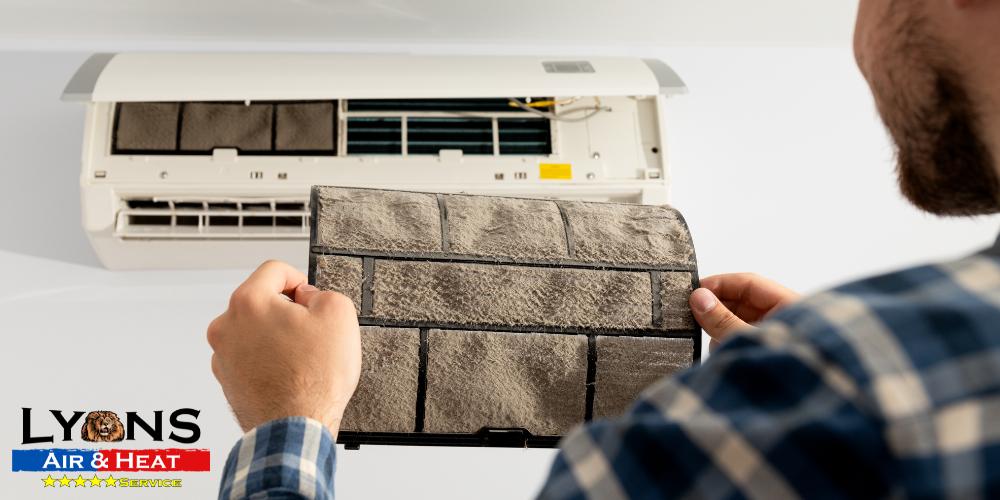
Signs Your Air Conditioning Unit Has Mold
While it can be hard to tell whether or not you definitively have mold in your air conditioner, there are a few telltale signs to look out for. If you notice one or more of these signs of mold growth, contact a mold remediation specialist and an HVAC professional. Together, they can help remove mold from your home and air conditioning system, ensuring you and your family are safe from dangerous mold growth.
Visible Mold
One of the easiest ways to tell if there is mold inside your HVAC system is by seeing mold in, on, and around your air conditioner unit. If you see any visible mold spots or clusters around your AC’s vents, grills, or drip pans, you may be suffering from a mold infestation. This often looks like black, white, or greenish patches of dusty particles.
Musty Odor
Air conditioning units that have a distinctive, musty smell often have mold growing within them. Musty odors like these are hard to miss and can make indoor spaces feel stale or unpleasant.
Increased Humidity
If your home feels more humid than usual despite the AC running, it might mean mold is hindering your unit’s dehumidification capabilities. Mold thrives in moist environments, and if your home is more humid than normal, you may end up dealing with a much more severe mold problem.
Respiratory Issues
Moldy air conditioners can cause people inside the home to suffer from respiratory problems.
If you begin experiencing unexpected coughing, wheezing, or difficulty breathing without having any underlying health problems, your AC unit may be distributing mold throughout your home.
Allergic Reactions
Having mold in your HVAC system can cause you, your family, and your visitors to have allergic reactions to the air inside your home. Mold can trigger allergic symptoms such as sneezing, itchy eyes, and nasal congestion, especially in those with mold allergies.
Skin Irritation
If you begin to experience unexplained skin irritation, you may never suspect mold to be the culprit, but it just may be the root cause of your issues. If your AC unit is circulating mold spores, you may begin noticing unexplained rashes, itchiness, or redness on your skin.
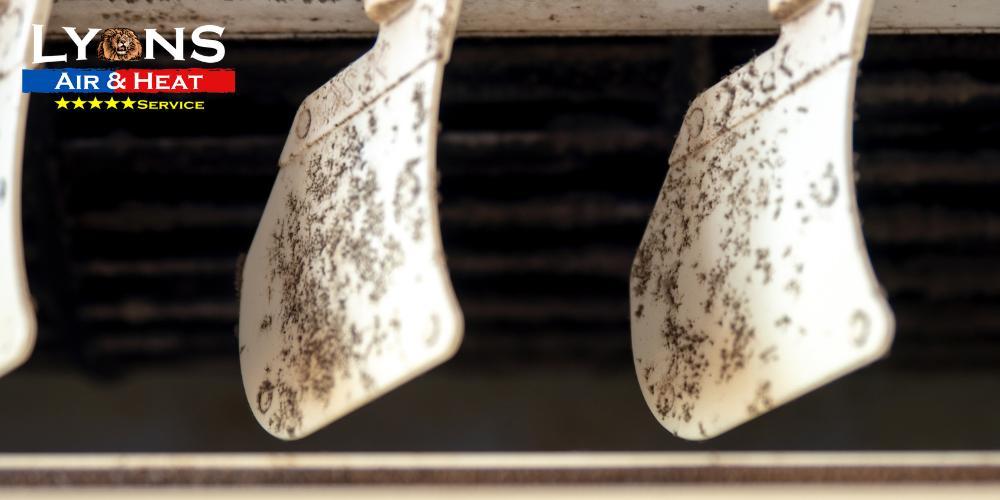
Inefficient HVAC Operation
If your AC isn’t blowing cool air or if it seems to be working harder than it should be, then you may have mold clogging your system’s essential components, hindering its operation. This lack of air movement can also cause additional mold to build up within your home, so it’s important that inefficient air conditioning systems are repaired or replaced as soon as problems start.
Water Leaks
Spotting water leaks around your AC unit can suggest that your system is suffering from condensation issues, which are a precursor to mold growth. Check your drip pans and empty them if they are full, and then call an HVAC technician who can help find the source of the problem.
Excessive Moisture Around Air Vents
Another sign that you may have mold in your air conditioner is any moisture on or around your air vents. Dampness or visible water droplets near air vents may indicate that your system is suffering from poor moisture management. This moisture buildup can not only be a sign of mold, but it can also increase the risk of mold growing around your vents.
Black Dust Around Air Vents
If you notice black dust accumulating around your vents, you may actually be looking at mold spores or fragments of black mold. This can indicate that your system has significant mold buildup and that mold is being carried through your air ducts.
Clogged Air Filters
AC units can’t properly draw moisture out of the air or push cold or warm air throughout the home if the air filters are clogged. Clogged filters may also have mold growing in them, so it’s important that you regularly check your air filters and replace them in a timely manner. If they have a damp or musty smell, you may want to go ahead and toss them.
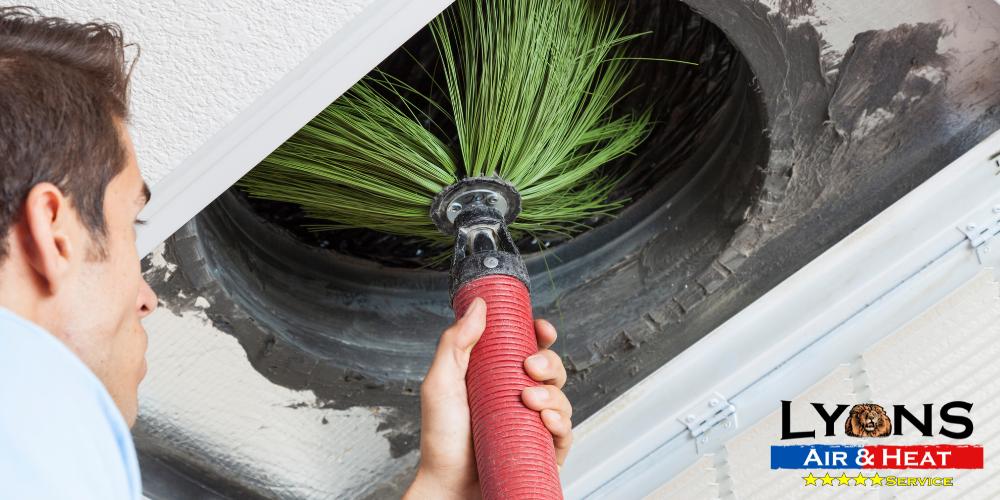
What To Do If Your AC Unit Has Mold
If you suspect that you have mold in your air conditioner, it’s crucial to address the issue promptly to ensure the health and comfort of your home. Firstly, if you can safely access the affected surfaces, you can clean mold off of them by using a scrubbing sponge and a mixture of water and white vinegar, a bleach solution, or a commercial mold cleaner.
Be sure that your AC unit is turned off before you begin cleaning mold in, on, or around your AC unit or its components, and remember to wear a face mask. Allow the area to air dry before turning your system back on.
You may also want to replace or clean any air filters and consider having your air ducts professionally cleaned to eliminate any spores or mold growth. If the infestation is extensive or if you’re unsure about the severity, consult with a mold removal expert.
You can also consult an experienced HVAC company. They can provide a thorough assessment and recommend actions, which may include deep cleaning, AC system repairs, or in extreme cases, replacement of certain components, like air duct replacement.
It’s also essential to address any underlying moisture or drainage issues to prevent future mold growth. If your home has high humidity levels, consider using a dehumidifier to remove excess moisture from portions of your home.
How To Prevent Mold Growth
Preventing mold growth in your AC unit begins with managing moisture in your home and ensuring your air conditioner is operating efficiently. Regular maintenance, like cleaning or replacing air filters and checking drainage systems, can help prevent mold from growing in and around your system.
Overdue for an air conditioning tune-up? Our team at Lyons Air & Heat can take a look at your air conditioner, HVAC ducts, vents, evaporator coils, and electrical components to ensure everything is operating the way it’s supposed to. If there’s mold growing in or around your system, we’ll spot it and provide you with actionable recommendations so that you and your family can stay healthy.
Annual tune-ups are not only great for mold prevention, but they can also help extend the life of your system and ensure your air conditioner is ready to help you beat the heat before summer starts, or help you stay warm and cozy in the winter. Lyons Air & Heat offers a preventative HVAC maintenance plan that provides annual AC tune-ups, ensuring your system stays in top shape. Investing in a regular maintenance plan can save you from costly repairs–and health hazards–in the long run.

Keep Your AC Unit Clean With Routine Maintenance From Lyons Air & Heat
Ensuring the cleanliness and efficiency of your AC unit isn’t just about comfort; it’s about health, safety, and extending the life of your system. A well-maintained air conditioner not only delivers optimal performance but also reduces the risk of mold growth and the associated health hazards.
At Lyons Air & Heat, we’re committed to helping the residents of Rockwall, TX maintain clean and efficient HVAC systems. The mold effective mold removal is done by preventing mold growth in the first place, so don’t wait for mold or other issues to take root. Give us a call at (469) 224-1512 or contact us online and ensure peace of mind knowing your system is in expert hands.

